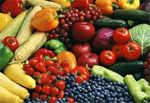|
|
Sea Veggies?
Posted by:
mindy66
()
Date: January 21, 2013 09:31AM What sea veggies are good to eat regularly on raw diet?
And...how much per day would you say?? Need help here. Thanks. Mindy  Re: Sea Veggies?
Posted by:
powerlifer
()
Date: January 21, 2013 03:00PM I like dulse and nori. I take kelp powder now and again because its a great source of trace and ultra trace elements which are hard to get from other land plant sources.
Nori you can make fake sushi with whatever fillings you like, shredded veggies etc so its fairly easy to consume. Dulse is very neutral tasting and delicate so easy to add to salads or soups etc. I know you have hypothyroidism so you will want to watch your iodine intake, especially as some types of hypothyroidism such as in the case of Hashimoto's can be aggravated by high intake of iodine. We do raw kelp powder from Canada Raw Kelp Powder Edited 1 time(s). Last edit at 01/21/2013 03:01PM by powerlifer. Re: Sea Veggies?
Posted by:
mindy66
()
Date: January 22, 2013 12:12AM Thanks PL!
I do not have Hashimoto's so I actually tend to need more iodine, which I have not been getting much of at all, if any, since switching to sea salt and raw. How much would you say is good intake for me or even for the avg person on a raw diet? Thanks again! Mindy  Edited 1 time(s). Last edit at 01/22/2013 12:14AM by mindy66. Re: Sea Veggies?
Posted by:
Living Food
()
Date: January 22, 2013 01:12AM Kelp (great source of rare trace minerals), dulse (great for spirituality), nori, wakame, etc. Every seaweed is edible raw, you just need to make sure that what you're buying is actually raw.
I generally have about a tablespoon of kelp a day and sometimes some of the other seaweeds too, but you can safely take 2-3 tbsp or maybe more everyday if you want to...it would probably be best for you to take fairly high amounts because of the hypothyroidism. The only drawback is that seaweed tends to be somewhat acid-forming, but you can easily counteract that with lots of alkaline green sprout juices. I think everyone should be having at least a tablespoon of seaweed powder daily because seaweed has nutrients you just can't get from land-based foods. Re: Sea Veggies?
Posted by:
John Rose
()
Date: January 22, 2013 01:30AM The high iodine content of sea vegetables causes some concern about overdosing on iodine. While taking in too much iodine can be toxic to the thyroid and is quite possible with regular capsules of the sea vegetable kelp, there is much less likelihood of overdosing on iodine from sea vegetables if you use the natural vegetables as ingredients in your meals in moderation. Naturopathic doctor, Michael Murray, recommends in his book, Encyclopedia of Nutritional Supplements, that adults not exceed 500 mcg iodine per day. For a reference point of the iodine content of sea veggies, a 1/4 ounce serving (equal to 7 grams) of dulse contains about 430 mcg. iodine, 1/4 ounce serving of nori contains 110 mcg., and a single gram of kelp contains up to 5,000 mcg of iodine! If you have any kind of thyroid condition, before adding sea vegetables to your diet, check with a nutritionally knowledgeable health care professional for advice. And whether or not you have thyroid problems, always use kelp sparingly.  Re: Sea Veggies?
Posted by:
mindy66
()
Date: January 22, 2013 02:56AM I belong to a Food Coop who buys from Azure Standard. Was just looking on their site for these things.
There is a company called Maine Coast who claims to do sun drying at low temps. Anyone know anything about this company?? Thanks all for your feedback Mindy  Re: Sea Veggies?
Posted by:
fresherthanlife
()
Date: January 28, 2013 12:55AM There are all sorts of sea vegetables available. For me personally, one of the only ones I find regular use for in making food is nori. Nori wraps are amazing! That and you can find raw nori in most health food stores quite easily.
I wouldn't say there's necessarily a daily allowance I know of that's recommended as far as sea vegetables go, just like there's no daily allowance of tomatoes, celery, carrots, lemons, etc. Incorporate them as they make sense for your diet, into recipes as you make them! [fresherthanlife.com] Re: Sea Veggies?
Posted by:
Panchito
()
Date: January 28, 2013 05:00PM I am not sure if Kale has Iodide (I-).
[curezone.com] from "Iodine, Why You Need It, Why You Can't Live Without It": "It was thought that the intestinal tract could easily convert Iodine to iodide, but research has shown this is not true. Different tissues of the body respond to different forms of iodine. The thyroid gland primarily utilizes ioDIDE....the breasts, on the other hand, primarily utilize ioDINE.... Because different tissues concentrate different forms of iodine, using a supplement that contains both iodine and Iodide is preferable to using a supplement that contains only one form, As mentioned above, the breasts concentrate iodine. The prostate gland concentrates iodine. The thyroid gland and the skin primarily concentrate iodide. Other tissues, including the kidneys, spleen, liver, blood, salivary glands and intestines can concentrate either form. With different tissues responding to different forms of iodine, it would make common sense that a greater therapeutic benefit from iodine will be achieved by using a COMBINATION OF IODINE AND IODIDE. My clinical experience has proven, beyond a doubt, that a combination of IODINE/IODIDE (e.g., Lugol's or Iodoral) is much more effective than an iodide only supplement(e.g., SSKI and most other liquid iodide formulations)." Re: Sea Veggies?
Posted by:
pborst
()
Date: January 28, 2013 05:43PM - avoid hijiki which is high in arsenic
- other things being equal, Atlantic ocean sea veggies are safer than Pacific (ergo, dulse, irish moss, etc). Why safer? the release of toxins from the Fukushima nuclear reactor and other release points from Japan resulting from the 2011 tsunami. Maine Coast veggies are a good alternative. - if you buy Pacific ocean sea veggies, check the source and the quality control. I personally like arame for its comparatively mild flavor. Socially responsible companies like Eden provide updates on their testing. [www.edenfoods.com]. So, I'm not saying avoid Pacific ocean sea veggies, just avoid hijiki and check your sources and you will be fine. The Pacific is a big place. And there is a lot of dilution and attenuation going on with pollutants. Paul Re: Sea Veggies?
Posted by:
mindy66
()
Date: January 30, 2013 05:09PM Love getting everyones feedback!
It is all very useful to me. Thank you so much!! Mindy  Re: Sea Veggies?
Posted by:
mindy66
()
Date: January 30, 2013 05:13PM Good gracious.
I just looked up Arame as I like the idea of mild flavor, Paul, but it is $12.05 for 2.1 oz. from Azure Standard (who my Co-op buys from). Very pricey! Is it possible that it has more iodine or iodide per oz. than other sea veggies? For whatever reason, Azure lists all Nutrients except for the iodine. Silly. Anyhoo, might you know the answer to this question?? Thanks much, Mindy  Sorry, only registered users may post in this forum.
|
|


